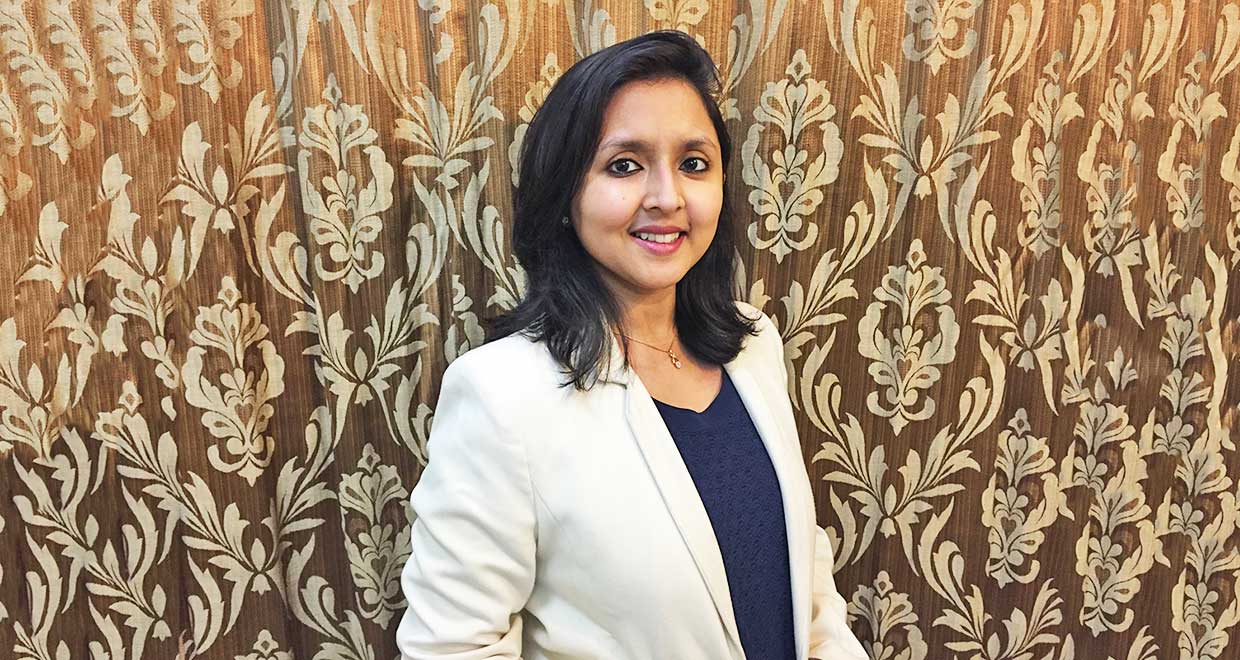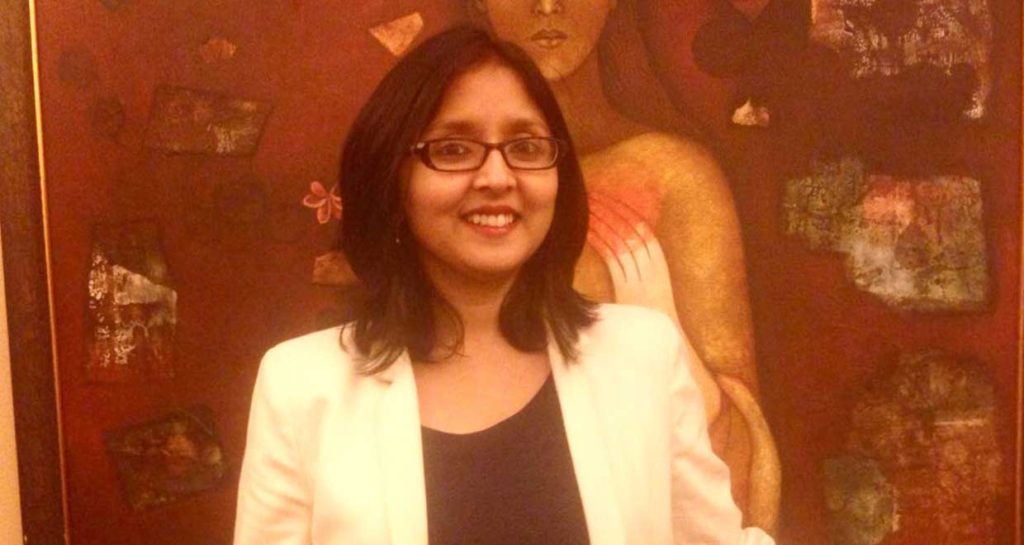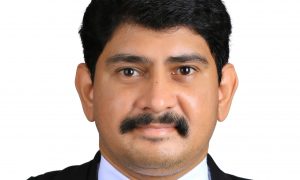Ankita Ray graduated from Symbiosis Law School in 2010. With excellent legal and soft skills, a profound love for the written word and a series of successful internships, after graduating she pursued a corporate law practice for a few years with J. Sagar Associates. She is now a Senior Associate in Cyril Amarchand Mangaldas.
In this interview, she shares her insights on:
- Interests and gravitating towards law and university life.
- Decisions in college – extra-curricular activities and maintaining a good academic record.
- Interning – how she chose her internships and the differential internship experiences in India and in Singapore.
- Working at Cyril Amarchand Mangaldas and the changes that being a senior associate brings.
How would you like to introduce yourself to our readers?
I am a senior associate with Cyril Amarchand Mangaldas, working out of their Mumbai office. I was in the Bangalore offices of Amarchand Mangaldas Suresh A. Shroff & Co. for a period of 2 years, before relocating to Mumbai. I started my professional life with JSA, Bangalore, after graduating from Symbiosis Law School in 2010.
Tell us about your life before you joined college. Where did your interests lie as school student?
My father’s transferable job took me across various cities and towns in India, and through 8 schools! This meant recreating a new social circle and inculcating aspects of new cultures every few years, if not months. I have always been interested in the written word and would probably have studied literature, if law had not happened. While in school, debating and mock parliaments were my favourite extra-curricular activities and I bagged a few laurels representing my school in various competitions. It is a plus that both these interests come in handy as a professional lawyer.
What made you gravitate towards law?
What made me gravitate towards law – this is an interesting one! I had the opportunity to be a part of the Indian contingent to the International Schools Olympiad held in Karachi, Pakistan, in 2004. Organised by The Telegraph in Schools, our journey to Karachi was much more than a competition, and was dubbed a peace mission: ‘Bonding Beyond Borders’. While I cannot say enough about the exhilarating experience that it was at various levels, this was the first time I had exposure to interesting discussions on various legal issues across borders, especially on international law. This piqued my interest in the legal field. Later that year, while deciding on which field to select for my graduate studies, I knew that I wanted to study law.
What extra-curricular activities did you participate in while in university? What do you think is the importance of moot competitions, mediation competitions and debates in aiding the overall development of a law student?
 My approach towards engaging in any form of extra/co-curricular activity is geared towards expanding my limits and gaining new experiences. Given that, personally, I do not think one kind of activity can be more important than the other. However, it is best to take a shot at every possible opportunity before deciding what you would like to be regular at. Moots etc. are definitely helpful in getting your research and speaking skills in place or to evaluate yourself in those areas. While it is important to move out of your comfort zone, it is also important to try to understand what you identify with.
My approach towards engaging in any form of extra/co-curricular activity is geared towards expanding my limits and gaining new experiences. Given that, personally, I do not think one kind of activity can be more important than the other. However, it is best to take a shot at every possible opportunity before deciding what you would like to be regular at. Moots etc. are definitely helpful in getting your research and speaking skills in place or to evaluate yourself in those areas. While it is important to move out of your comfort zone, it is also important to try to understand what you identify with.
The first couple of years in college, I was into debating (and won the best team in debating in Mood Indigo and a Rotary Club debate). Thereafter, having interned in law firms by then, I realised the importance of having adequate drafting skills. Further, I realised I enjoyed the entire process of researching and putting it down on paper in the form of an article. I won the national first prize for an essay on cyber crimes, in a competition organised by Competition Success Review, in 2013 and a couple of articles also got published in Manupatra.
How important is a CGPA for recruiters to assess students? How did you maintain a balance between a good academic record at university and your extracurricular activities?
Let’s put it this way: for the purposes of campus recruitment, CGPA is one way for recruiters to shortlist from a large number of students. Also, if one intends to pursue a Masters degree, academic scores will be relevant. Any which way, it never hurts to keep your academic records in good shape.
It was not very difficult to maintain a balance between a good academic record and extracurricular activities! During our time at Symbiosis Law School, we did not have the concept of weekly assignments and exams (which have been introduced now), which made it a bit easier. However, like in everything, time management is essential – usually keeping a fixed time (even if it is half an hour a day) to devote to your extracurricular activities works well.
Tell us about your internship experiences. How did you choose your internships? How early did you apply? Are there any things that an applicant must keep in mind?
Initially, I wanted to test out as many avenues of the legal profession as possible, in order to make an informed decision on which one I would want to follow. Therefore, I interned with an NGO, a senior counsel in the Kolkata High Court, in the legal departments of Vodafone India and ICICI Bank and law firms, in that order. Post my first internship in a law firm (Khaitan & Co., Kolkata) I realised that I would like to work in a law firm environment. Hence, all my internships thereafter were in law firms.
I applied anywhere between 6 – 9 months in advance. Very often, during an internship, my reporting/mentoring lawyers were kind enough to either get me a follow on internship or refer me to other firms for internships, when requested. Similarly, seniors from college were a great help when it came to getting internships.
A couple of things that an applicant for internships must be careful about, even before actually joining an internship, is their application email (which should be without any grammatical or spelling errors and customised) and their resume (which should not be very long). Following up after sending an email requesting for an internship opportunity is another important matter.
You interned at reputed firms in India as well as a firm in Singapore. How was the internship experience different? What did you gain from the experience?
I was lucky to get an opportunity to experience the workings of a foreign law firm during my stint at Drew & Napier in Singapore, which added another dimension to the entire internship experience. The chance to examine the laws and experience the workings of the judicial process of a different jurisdiction was a fruitful experience. Meeting lawyers and co-interns from Singapore and other countries like Australia, France etc., having discussions on comparative aspects of laws from our respective countries was truly enriching.
You joined JSA after graduation. Tell us about your experience at the firm and the work profile you were entrusted with.
Like all firsts, my tenure at the Bangalore offices of JSA (where I began my career from), is memorable in many ways. I got an interesting mix of work there, ranging from technology law (this was in 2011, when the privacy rules were enforced) to transactional matters.
Since I hear a lot of complaints from juniors about doing due diligences, one thing I would specifically like to mention here is that in my first year of work, I also did a lot of due diligence exercises. Contrary to popular belief, due diligence exercises were a great learning experience since they exposed me to the entire gamut of laws that may be applicable and a range of different sectors.
You have now been made senior associate. How different is the work from being an associate and what challenges have you had to deal with since?
 At the Senior Associate level, you need to be thorough with your field of law. You are expected to have ready answers which are legally sound and which can be implemented in practice. It is also essential to develop skills (both, legal and soft skills) to handle clients on your own and maintain an ongoing relationship with them.
At the Senior Associate level, you need to be thorough with your field of law. You are expected to have ready answers which are legally sound and which can be implemented in practice. It is also essential to develop skills (both, legal and soft skills) to handle clients on your own and maintain an ongoing relationship with them.
In terms of work, there is a shift from taking the first crack at a document to reviewing a first draft worked upon by a junior. In this regard, there is also a role of mentorship that you play in your own small way.
Additionally, you are increasingly aware of the business side of law practice – invoicing and revenue generation, networking to generate more work etc.
Apart from corporate/commercial matters, you now handle a lot of labour and employment matters. Could you give our readers a glimpse into what the area deals with for those interested and the type of matters one may expect to deal with?
Previously, employment and labour laws were pertinent more from the perspective of protection of blue-collared workers. However, with increasing interest in India as a destination for foreign investment, finer issues in this field of law have arisen. Hence, employment law practice has now assumed greater significance, with many law firms recognising it as a separate, albeit upcoming practice area.
In terms of work, there are primarily four buckets one may consider: The first being employment advisory which covers complex issues of trade union strategy, high profile terminations, large scale downsizing and retrenchments in all sectors, sexual harassment complaints, as well as routine matters such as employee handbooks, appointment letters etc.
The second bucket of work is transactional – conducting human resources due diligence, employee movement, transfer of employee benefits, recognising employment related risks in different types of transactions, whether business transfer or share acquisitions.
The third bucket of work is contentious matters such as wrongful terminations, internal investigations, disciplinary procedures, sexual harassment complaints and includes representations before the labour commissioner.
The fourth bucket is compliance – where we conduct employment health checks for companies and assist in identifying risks and advice on best practices.
The practice of employment laws is interesting and challenging given the human element involved in every situation – no two people react in the same way and often each situation we advise on throws up different issues, which are often time sensitive and have to be dealt with. Therefore, it involves thinking on your feet, where you have to complement your legal knowledge with a practical approach towards the issue at hand. With regard to the kind of work one can expect, there are no two days which are similar! And that is what makes this practice area invigorating!
Finally, what advice would you have for our readers, most of whom are college going students?
While at law school, try to participate in as many activities as you can, be it moots, debates, mock parliaments. Also, I would emphasise doing as many internships as possible, because there is no alternative to gaining practical experience. However, do enjoy the college days!



























